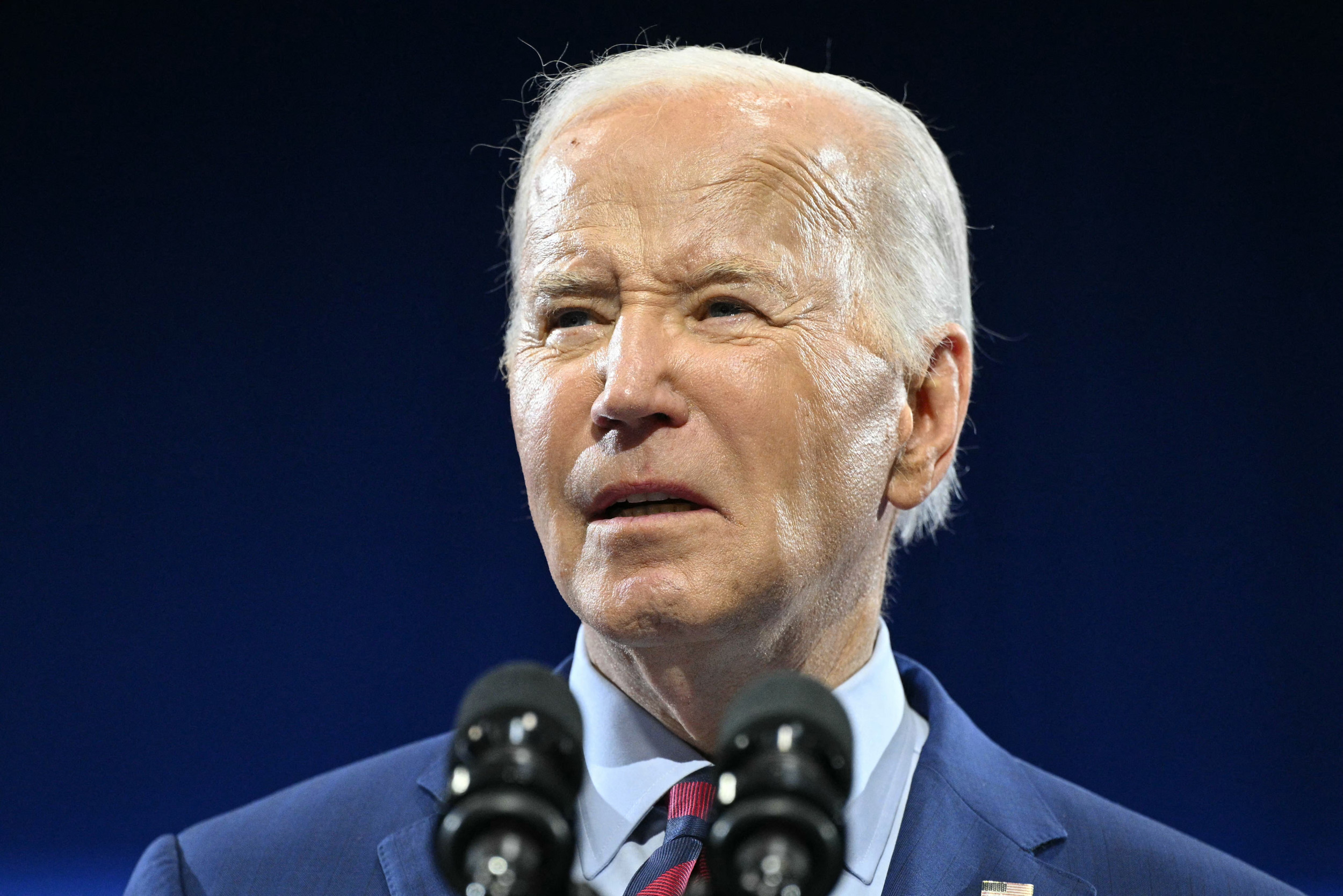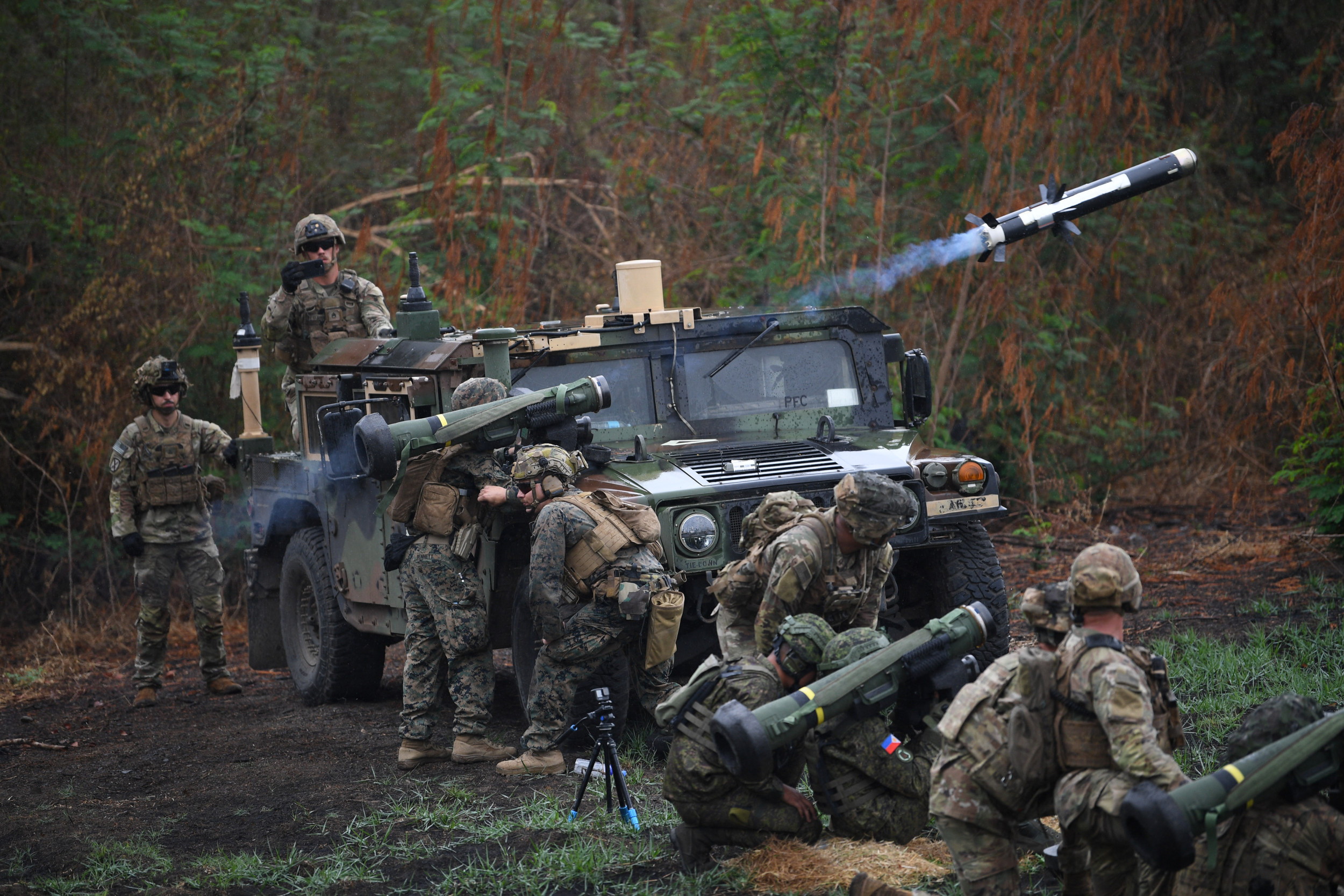This story is the second in Newsweek's "Covert China" series exploring how China is working to expand its influence in order to achieve global preeminence by 2049.
Inching up the Elbe river to the German port of Hamburg in early September, colorful containers stacked on deck like outsized pieces of Lego, the Libra looked like any other massive vessel plying the world's oceans. Yet she was more than a commercial ship seeking haven.
As well as the containers, the Libra carried a branch of the Communist Party of China (CCP), its political commissars, and a crew who must pledge loyalty to the party and to increasing China's economic power and national strength.
The party calls them "floating fortresses." These mighty vessels are at the forefront of long-term efforts by the CCP to strengthen a hold on global shipping and logistics, prompting concerns in some Western countries over risks ranging from espionage to economic coercion, digital domination and military expansion.
Ships like the Libra belonging to China COSCO Shipping Corporation are increasingly evident at nearly 100 ports where it and other Chinese companies have stakes. These include five ports in the United States: in Miami, Houston, Long Beach, Los Angeles and Seattle.
"Trade is the circulatory system for the planet," said Isaac B. Kardon, a maritime specialist and Chinese linguist at the U.S. Naval War College on Rhode Island. "Ports are the nodes."
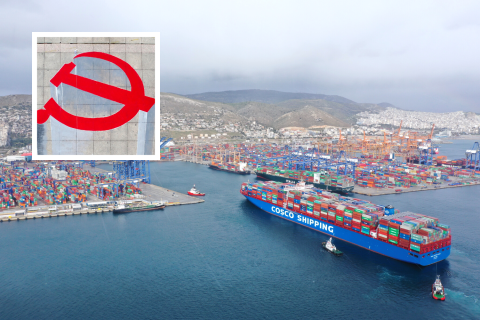
Defenders of the investments say they make commercial sense for the world's biggest exporter and should not be feared.
Critics see long term potential for power projection by a country that fuses political, business and military interests under the Communist Party umbrella.
Highlighting that overlap of interests, about one-third of the ports where Chinese companies made commercial investments have hosted ships of China's People's Liberation Army (PLA) navy.
Sailing for the Motherland
Newsweek's reporting, and an internal COSCO publication, show how the Communist Party operates inside a company that presents itself as a modern business partner abroad but proclaims at home it "follows the party's direction and sails for the motherland."
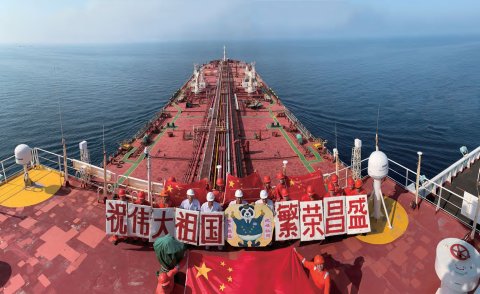
Although COSCO is not the only company strengthening China's maritime presence, it is the biggest. COSCO did not respond to Newsweek's requests for comment.
"Cosco is really the only shipper in China," said Rolf J. Langhammer, an economist at the Kiel Institute for the World Economy in Germany. This gives it tremendous control over Chinese exporters – and in foreign ports. China is already the world's biggest exporter, moving about 15 percent of global goods. The U.S. exports about eight percent.
"It can say, 'if you don't allow us to be a partner in your port, we can stop goods from China reaching your port.' This is something only a state-owned enterprise can do," Langhammer said.
Rare Glimpse of Communist Party On Ships
The Central Committee of the CCP set up COSCO in 2016 in a "major strategic move" to build a dominant position in global trade. China must be a "powerful gravitational field" for world trade, Chinese Premier Li Keqiang said in 2021.
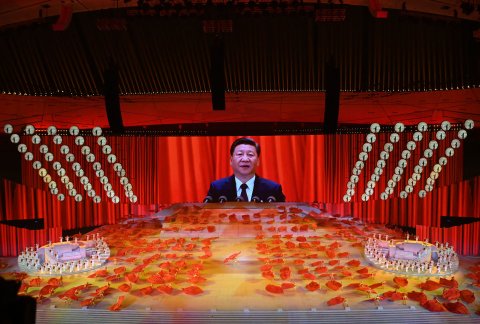
As a state-owned enterprise, the party's powerful Organization Department appoints senior officials. COSCO chairman Xu Lirong is also company party secretary. This system is known as "one organization, two brands."
A 70-plus page publication for COSCO crew labeled "internal information" seen by Newsweek gives a rare glimpse of CCP activity.

Below decks piled high with containers, in low-ceilinged cabins, photographs show political commissars gathered with sailors and officers in "special party branches." Little yellow and red books with ideological texts lie on tables. Video screens beam in messages from China's leaders.
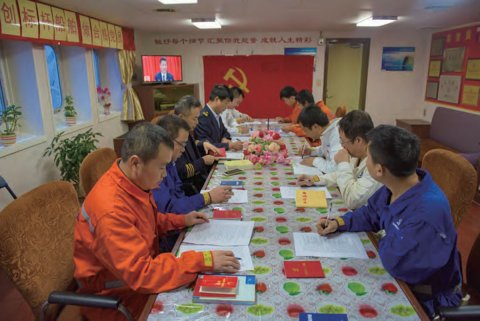
The system fans out across the world. Newsweek was able to identify 40 COSCO ships with party branches. According to leaked party lists from Shanghai, the branch on the Piraeus has 64 members, the New York 23, the Africa 52 and the Surabaya 24 — but the data isn't complete. As "ship-to-shore branches," they are probably active in overseas ports as well as on high seas.
About 1,000 commissars manage political discipline among crew, Han Chao, secretary of the Crew Party Committee, said in a 2019 report published by the in-house COSCO Shipping Seafarer. There are about 10,000 regular party members among crew and 150 special cadres, a higher kind of functionary, Han said.
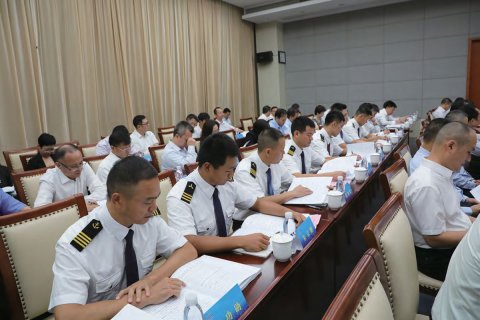
On the COSCO ship Rose, "the ship's party branch educates its members about the latest theoretical achievements of the Party," the publication says. It rattles off obscure but important dogmas that permeate life in China, such as "enhance the four self-confidences," before concluding the ship's party branch is "a core for uniting the masses and a fortress for overcoming difficulties."
The party is always suspicious of outsiders. "Crew must prevent the planting of false evidence by foreign hostile forces and safeguard their own rights and interests" while in overseas ports, Han said, without elaborating. They must follow Beijing's "foreign affairs discipline," he said.
It is a risk for other countries, said Martin Hala, the founder of Sinopsis, a think tank in Prague, Czechia.
"Party members are bound by party discipline to carry out whatever tasks the party might require," Hala said. Chinese citizens are already required by law to cooperate with intelligence services, he noted. "This is one level deeper."
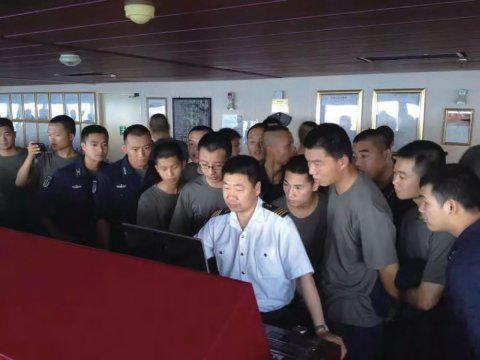
Germany's Biggest Port in Chinese Sights
One of COSCO's latest targets is a 35-percent share in operations in the Tollerort terminal where the Libra docked in Hamburg in early September. If it succeeds, Hamburg will be the 96th port around the world where Chinese companies are known to have a stake, according to maritime security and economics researchers.
It would add to a necklace of ports in Europe from Piraeus in Greece clockwise round to Gdynia in Poland, giving the shipper a stronger hand on a vital commercial artery in Germany, the European Union powerhouse that is also NATO's second biggest economy after the United States.
"There is a high strategic dimension to taking a stake in a terminal," says Jan Ninnemann, a logistics professor at the Hamburg School of Business Administration.
Such as having a say over which ships come and go, when cargo is loaded and unloaded, where it goes, Ninnemann said. Other analysts highlight that port and logistics operators handle large amounts of company, transport and personal data in increasingly digitized supply chains, may instal China-built internet communication technologies to work these and even access local government administrations.
China's port acquisitions aim to create "strategic strongpoints," Kardon says, where different kinds of power flow together, creating leverage.
A Growing Hold on North Sea Ports
Last year, when COSCO Shipping Ports Limited struck a deal with the Hamburg port authority Hamburger Hafen und Logistik AG (HHLA) for a stake in the Tollerort Terminal, it marked a major shift by a port that had previously resisted shippers owning terminals. HHLA told Newsweek its agreement with COSCO was "strictly confidential."
Hamburg would be the last of seven North Sea ports in the so-called "Nord Range," which is important to transatlantic trade and communications, to get a China stake.
Zhang Dayu, managing director of Cosco Ports, said Hamburg was "a keystone of logistics in Europe and has excellent future development prospects." Zhang promised more business for Hamburg if the deal goes through.
Some businesses may already be aiding surveillance in China. Exactly a year earlier, in September 2021, the Libra left Hamburg for Shanghai carrying a light helicopter and training platform made by the German company RS Helikopter GmbH. According to Chinese-language reports, the aircraft can be used for "police patrols" and is in action in Lishui, China. Human rights organizations say China's Public Security Bureau engages in mass surveillance of citizens.
Germany's economics minister, Robert Habeck, from the environmentalist Greens party, opposes the Hamburg deal. Even in Germany, which has no national security strategy, ports are defined as part of critical infrastructure and the European Union has said China is a systemic rival. Well-placed sources in German commercial circles say senior EU officials in Brussels also oppose it because of strategic concerns.
"It's true that the container port Tollerort is only a small part of the entire port of Hamburg, yet through this part China can influence the trade and the political direction of Hamburg port," Habeck said in September. "China is trying to secure strategic assets for itself in Europe and in this way to influence European and German trade policy, and we shouldn't allow that." Habeck also singled out concerns over human rights as a reason to nix the deal.
Yet the city's shipping and business communities – and, government sources say, the Chancellery of German leader Olaf Scholz in Berlin and the influential Finance Ministry – are in favor, citing commercial gain. Hamburg business sources say COSCO has threatened to take its offer to the port of Gdansk in Poland if Berlin says no.
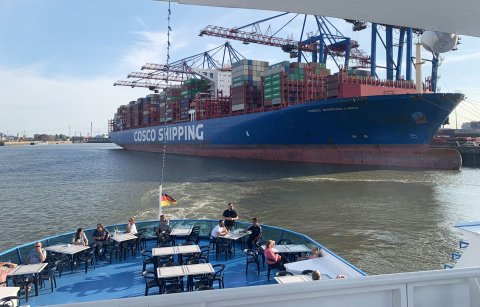
Growing Global Networks
Germany's place as the world's third biggest exporter gives it particular importance. But it is just one point in a widening ports network.
Well over half the expansion has happened in the past decade under the leadership of President Xi Jinping, according to a study by Kardon of the Naval War College and Wendy Leutert of the Hamilton Lugar School of Global and International Studies at Indiana University.
It is part of Xi's "Belt and Road" initiative - an ambitious plan for sea routes, rail links, and digital connectivity aiming to bind Europe, Asia and Africa to China - but it has reached the Americas as well.
When Xi Jinping clicked a mouse in Panama in December 2018 so the COSCO Rose could squeeze through a narrow lock linking the Pacific to the Atlantic via the Panama Canal, he did so in a country where Chinese companies have stakes in three ports.
By walkie-talkie, Xi instructed the Rose's captain, "promote our national shipping business and make world trade more prosperous!" About 300 Cosco ships pass through yearly, the company says.
Elsewhere in Latin America, Cosco acquired a 60 percent stake in operations in Peru's Chancay port in 2019. Significantly, it connects to a large logistics park in Callao port in Lima.
Despite COSCO's current five holdings in the U.S., further expansion is considered unlikely amid concerns over Chinese state-owned enterprises owning or operating critical infrastructure, Kardon said.
Illustrating that, when COSCO bought a Hong Kong shipper, Orient Overseas International Limited, in 2018, the departments of Homeland Security and Justice obliged Orient Overseas to sell a terminal it owned at Long Beach port as part of a national security agreement – so COSCO would not acquire more infrastructure.
Across the Atlantic, activity is more intense.
Chinese companies have stakes in 61 port facilities in 30 African states. Just eight African coastal or island countries do not host China-owned port infrastructure.
Moving north and east into the Middle East, concessions dot Morocco, Egypt, Saudi Arabia, Iraq, the United Arab Emirates, Oman — even U.S. ally Israel.
One of COSCO's greatest coups was securing majority control of Piraeus Port Authority in Greece as well as its terminals and operations.
Piraeus port's commercial success since COSCO acquired its stake in 2016 has given ammunition to those who say concerns over Chinese ownership are overblown.
COSCO is already among the world's top three or four shippers and it's normal that Chinese companies want to gain port and logistics facilities, they say.
"It's easy to over-interpret Chinese investments," said Charlie Du Cane, a British shipping executive. "China is becoming a larger piece of world trade, and the supporting logistics puzzle behind it. And then you end up owning more things."
Yet because of China's fused economic, political and military system, its presence in ports presents other risks including espionage, said a former Australian Army intelligence officer.
And those have been raised by another investment in Germany.
A New Power in Kaiser Wilhelm's Haven
About 80 miles southeast of Hamburg in the naval town of Wilhelmshaven, named by Prussia's Kaiser Wilhelm I after himself in 1869, state-owned China Logistics Group has acquired a 99-year lease to build a logistics center in a new commercial port.
Ships arrive from China and, since 2021, so does a goods railway, all the way from Hefei in Anhui province.
Yet just three miles across dyke-lined lowlands is Germany's biggest navy and logistics base at Heppenser Groden. Here, Deutsche Marine ships are built and repaired, submarines visit, intensive communications with NATO allies take place, and joint exercises begin. It's home to Germany's international fleet.
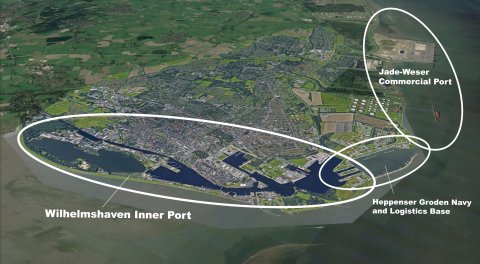
It was to here that the Frigate Bayern returned home this year after a 7-month passage through the Indo-Pacific to Australia and Japan - the first such German voyage in two decades, designed to send a message to China amid growing tensions in the Western Pacific principally over Taiwan.
The Bayern sailed right past the Jade-Weser Port with its 50-acre Chinese logistics site.
Strategic military assets would be advised to turn off their signals when passing, the intelligence officer said. There were also tactical risks and the possibility of human intelligence gathering, he said.
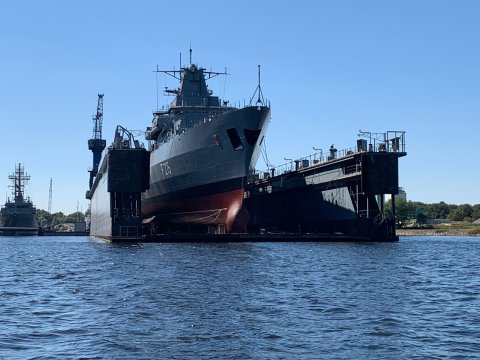
But for the two German local state governments that lease the hub to the Chinese enterprise, it is a source of pride. They marketed the 100 million dollar investment as part of the Belt and Road, calling it the "China Logistics-Wilhelmshaven Hub."
A port spokeswoman, Susanne Thomas, said 99 years was a legal lease in Germany though the port only advertises 30- to 75-year leases. There was nothing strategic about the investment, she said.
Dean Cheng, a former senior research fellow at The Heritage Foundation in Washington, D.C., disagreed: "In Wilhelmshaven, the ability to spy from the commercial port to the naval base is unimpeded," Cheng said, pointing to U.S. plans to dismantle far smaller cell towers of Chinese firm Huawei close to military locations.
Officials in the state of Lower Saxony, where Wilhelmshaven is located, did not reply to freedom of information requests asking for details of contractual agreements. The Jade-Weser-Port company declined to share details, citing confidentiality.
In a statement, the German defense ministry hinted it was aware of risks.
"We generally do not comment on questions of military security at individual sites, including any agreements with the authorities," a spokesman said in an emailed statement. "You can assume, however, that we constantly keeping an eye on things and, where necessary, also carry out adjustments."
Heading off Sanctions
Yet physical acquisitions – even of different kinds – are only part of the story. China is also moving fast on the digital front.
China's Ministry of Transport offers a state-subsidized "one-stop-shop" platform called Logink to manage digitally global logistics, shape international trade flows, and, potentially, identify supply chain weaknesses, analysts say.
In a recent report, the U.S.-China Security Review Commission raised security concerns over Logink's vast data gathering capacity. At least 20 ports have joined and many companies. COSCO is also working with Chinese company Alibaba on sophisticated global trade payments systems, including blockchain technology to track goods and facilitate automatic payment.
There is a long, strategic game, Langhammer said: Ultimately, China wants to build up a strong enough position so it can protect itself from economic sanctions such as the world levied on Russia after that country invaded Ukraine. China has long threatened to invade Taiwan, which it claims.
China itself has a track record of using trade as a weapon. Japan, Taiwan, Australia, Lithuania and Norway have all been punished with unofficial trade boycotts. After Australia requested an independent investigation into the origin of the COVID-19 pandemic, many exports to China, including wine and barley, were – mysteriously – blocked.
China is gaining leverage, Cheng said.
"There is the polite aspect, 'I want to invest in your country,'" he said. "But there is the harder line which is, 'I am heavily invested in your country and you wouldn't want me to pull out or hurt you, would you?'"
PLA Navy Visits in China-owned Ports
Chinese military strategists see commercial and military strength as entwined, as an image in the COSCO in-house publication suggests.
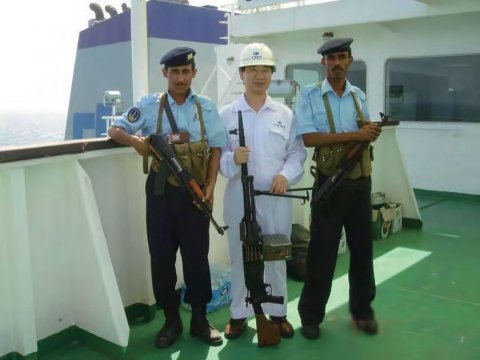
Importantly, People's Liberation Army Navy (PLAN) ships have made port calls or "technical stops" in 32 ports where Chinese companies acquired commercial infrastructure, Kardon and Leutert's research shows.
The U.S. government believes COSCO was building a naval facility in Khalifa Port in the United Arab Emirates, leaking the information to the media "to send a wide message," according to a regional security expert. Construction was shut down by the Abu Dhabi government, almost certainly under U.S. pressure, the person said.
Du Cane, the shipping executive, says China is following a different path from the U.S. and other countries that broadly keep commerce and political power apart.
"The U.S. is surprisingly small in the global shipping industry. And in terms of ports, their military is completely separate from their economic activity. You just don't have that linkage between commercial and the military," Du Cane said.
About 30 Chinese companies are involved in the port acquisitions. Most are state-owned. The two biggest, COSCO and China Merchants Ports, often have stakes in the smaller firms. A third major player, Hutchison Ports in Hong Kong, is privately owned but also under Beijing's influence.
Foreign shipping companies such as Maersk, the market leader, have operations in China in joint ventures as a minority partner, Du Cane said.




